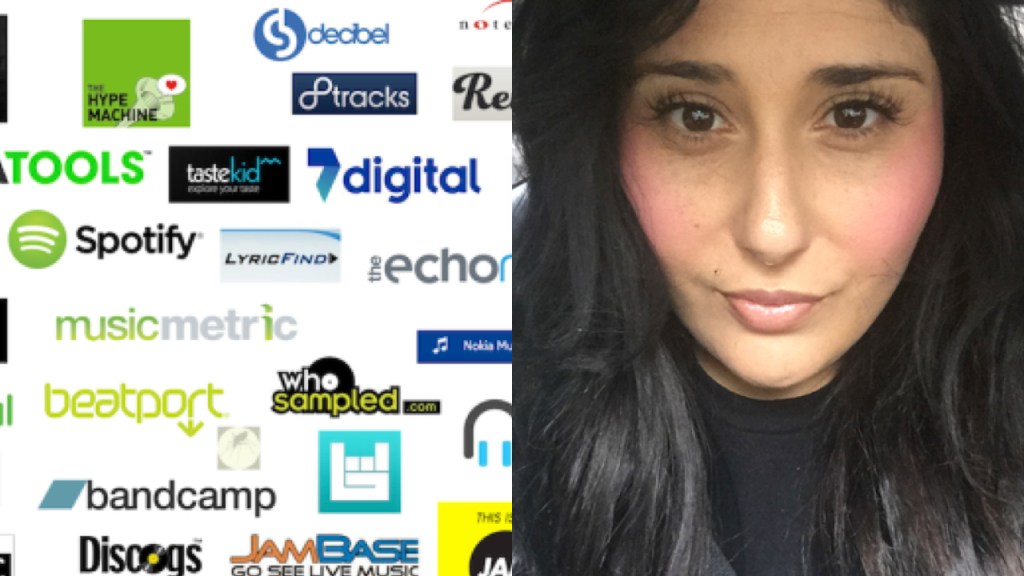As part of our partnership with AustralianSuper, Music Feeds is bringing you insight and advice from behind the scenes of the music industry, so you can get cracking on that glorious career as Australia’s next big industry figure!
In today’s entry, head of publicity at Cooking Vinyl Australia, Janine Morcos, walks us through exactly how she’s seen the music industry evolve over her years in the scene, and how she’s learned to deal with the new media landscape.
Over my years working as everything from a receptionist at a music label all the way through several PR and marketing jobs to my role in publicity now, I’ve seen first-hand the way in which the global and local music industry has been forced to evolve. Here are the major shifts I’ve seen and how I’ve learnt to always be on top of a constantly shifting industry.
Indie Labels being acquired by major labels
In April 2012, Warner Music Group acquired the majority stake of leading hard rock and metal label, Roadrunner Records. Founded in 1980 in the Netherlands, Roadrunner Music Group is one of the industry’s leading Hard Rock label groups breaking acts such as Nickelback, Slipknot and Machine Head to name a few. It was a first of many independent labels being acquired and integrated into the major label systems which has since included the likes of BMG fully acquiring metal and hard rock label Rise Records and indies Infectious and Vagrant Records.
As you can see this is happening a lot more frequently, even now. I was still working at Roadrunner Records when I witnessed a few major impacts during the Roadrunner Records and Warner Music acquisition and learnt that although there is negative fallout surrounding acquisitions, it’s all part and parcel of the industry in the current landscape.
I personally witnessed roles get changed as the company was absorbed. People lost their jobs, whereas daily duties and responsibilities entirely shifted for others. In my case, my role changed from overseeing national campaigns and outlets to only looking at a handful of media. I went from looking after hard rock and metal acts to working with artists across all genres and frankly, it was something I just had to deal with and learn from.
I learnt that adapting to change was the only way of securing my position long term. This is one of the many ways the music industry has evolved and it won’t be the last. Being able to go with the flow in the face of large structural changes is an ability you’ll need, if you wish to have a long and successful career. Next time you apply for a job in the music world, know that in 12 months you may be doing something entirely different, but make sure you’re prepared to embrace it.
Rise of digital vs physical
It’s no secret digital is on the rise as physical albums decline, however we need to recognise that globally, physical sales still make up over half of the market.
Physical sales have been long in decline, however the sheer scale that this market once had, and its legacy to consumers (e.g. collectors of special editions or vinyl) means that it is still a revenue stream, which some detractors of the new landscape often overlook.
In Japan, 78 percent of the music industry’s revenue comes from CDs and the like; in Germany the figure is 70 percent, and in France it’s 57 percent. By comparison, some countries have overwhelmingly moved from downloading music to streaming it, with nations like Sweden (the birthplace of Spotify) generating 92 percent of its digital revenue from subscriptions.
Expenditure on subscription services is growing rapidly (45% year on year growth) and forecast to become the largest of all channels in the coming years and it’s not only fans who are finding out about new music via Spotify recommendation lists, and playlists, it’s industry folk as well.
At the end of the day learning to adapt with the changing trends of the way music is being consumed, promoted and marketed is vital, but don’t enter the music industry under the guise that physical is dead. Whilst you yourself may not be someone who appreciates or interacts with physical music releases, an understanding of its current role and its relationship with digital will ensure you don’t get left behind.
Social Media Marketing
Social media and mobile technology has changed how we market and promote releases in the last few years alongside the growth of how music is consumed. Social media gives you the ability to target and reach out directly to your fans and engage to the core fans and beyond. It has also increased the level of interaction across the board and if done well, can be the difference between a critical and commercial hit, and a flop that no one listens to.
Advertising on social media platforms such as Facebook, Twitter and Instagram receive very successful results and is as simple as clicking a few buttons. But I’m hesitant, and so should you be, about relying solely on social media marketing to do the job.
Obviously we see the change of print media and the shift of publications moving to digital platforms happening week in and week out. Publications rely on our support and we rely on their coverage, so as they continue to evolve across the digital landscape, so should we.
One of many reasons for the shift is that consumers rely on fast content. They want to read what’s happening now and digital allows for the speedy turn around. I’ve seen this change a lot over the last 10 years and I’m seeing more and more that we need to encourage that unique digital content and online advertising placements co-exist alongside more old-school strategic marketing rollouts.
A particularly new approach which the next generation of music PR and marketers need to properly grasp is the blurring between the lines of these two. Whilst putting a hashtag or a QR code on a physical billboard or bus stop ad may seem naff at the moment, as technology advances there will very soon be opportunities for marketing approaches that defy what would even be considered “advertising” only five years ago.
If you’re getting into the music industry as a fresh-faced go-getter now, this is 100% something that will impact your career, sooner than you think.
Festival Landscape:
In the past few years we’ve seen the rise and fall of festivals with the market in particular shifting quite dramatically in the past 12 months.
I worked at Soundwave Festival in the peak of what some may consider the golden era of Australian music festivals. The dollar was strong and the consumers were spoilt for choice. We had a niche festival for every genre of music and Soundwave, in my eyes, was always a festival for the fans. For awhile the line up was bigger and better every year and the ride looked like it was never going to end.
Gallery: Soundwave Memorable Moments 2008 – 2015
Obviously, as we have now come to understand, the scene soon became over saturated with too much choice and too many similar festivals competing for the comparatively small Australian market. January 2016 was the first time in over 10 years with no touring festival. Is this is the end? Of course not.
Like labels, the touring market is forever evolving. Australian festivals will make a come back, and until then there’s a wonderfully vibrant collection of “boutique” and small to medium sized festivals keeping the music flowing around the country.
Whereas it was once great for a band to have “as seen at Soundwave 2015” on their promotional material, “Appeared at Unify, Groovin The Moo, Mountain Sounds, Secret Garden” and so forth is the new standard approach. The more the merrier, am I right?
If you’re just starting out in your career, a few right moves early on can help set you up for life. For more stories in our AustralianSuper KickStart series, click here or go to AustralianSuper.
This article has been sponsored by AustralianSuper Pty Ltd ABN 94 006 457 987, AFSL 233788. The views and opinions expressed in any article accessed through Music Feeds are those of the author or Music Feeds and not the responsibility of AustralianSuper. For more information, please visit australiansuper.com
Soundwave Festival: Memorable Moments
-
Backstage<br />Soundwave 2013, Brisbane

"I think I took a photo of this jacket at just about every Soundwave Festival in Brisbane. I would always come up the day before and take some photos of the site being setup. This jacket belong to one of the loaders and I always thought it was such a badass!"
Photo by Kane Hibberd - Book: Kanye Lens Vs Soundwave Volume 1 -
Backstage Gear<br />Soundwave 2013, Perth

Photo by Kane Hibberd - Book: Kanye Lens Vs Soundwave Volume 1 -
Plz Let Me In! Soundwave 2010, Melbourne

Photo by Kane Hibberd - Book: Kanye Lens Vs Soundwave Volume 1 -
Waiting Patiently Soundwave 2012, Melbourne
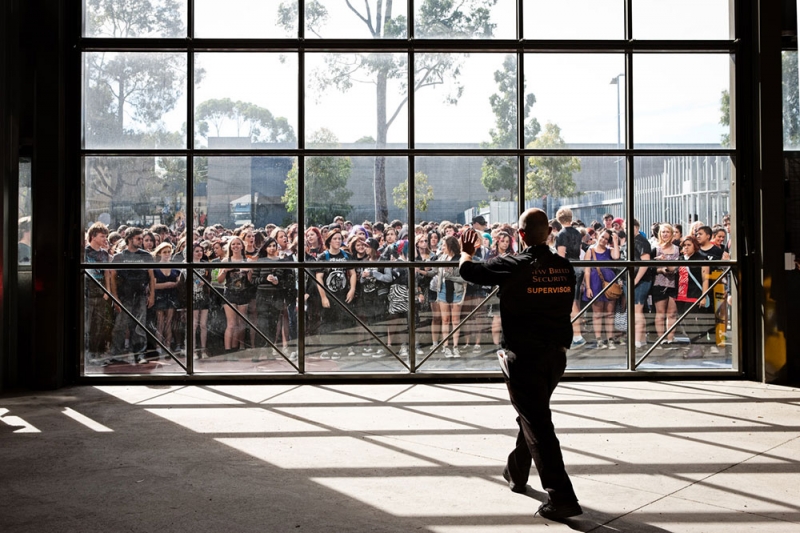
Photo by Kane Hibberd - Book: Kanye Lens Vs Soundwave Volume 1 -
Merch Tent Soundwave 2014, Melbourne
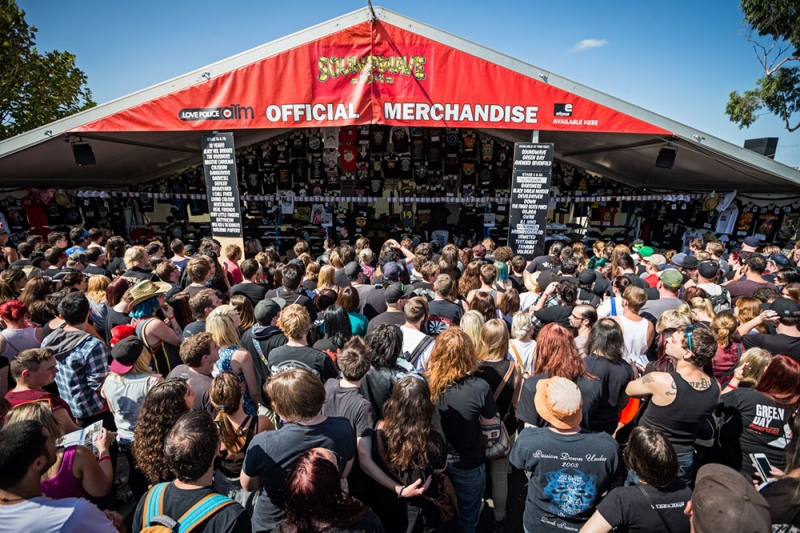
Photo by Kane Hibberd - Book: Kanye Lens Vs Soundwave Volume 1 -
Wonder Women Spotted At Soundwave 2015, Sydney

Photo by Kane Hibberd - Book: Kanye Lens Vs Soundwave Volume 1 -
Mario Makes An Appearance Soundwave 2013

"It takes dedication to go to a festival dressed up. I think it was another 30+ degree day in Sydney the day this was taken, it must have been so hot in there. A guy dressed up as Mario about to run into a wall of death? Dream photo. It could only have been better if Luigi was coming the opposite way."
Photo by Kane Hibberd - Book: Kanye Lens Vs Soundwave Volume 1 -
Gallows<br />Soundwave 2010, Sydney

Photo by Kane Hibberd - Book: Kanye Lens Vs Soundwave Volume 1 -
Blink-182<br />Soundwave 2013, Melbourne

Photo by Kane Hibberd - Book: Kanye Lens Vs Soundwave Volume 1 -
Soundwave 2014, Perth

Photo by Kane Hibberd - Book: Kanye Lens Vs Soundwave Volume 1 -
A Quick Refill (DragonForce) Soundwave 2013, Perth

Photo by Kane Hibberd - Book: Kanye Lens Vs Soundwave Volume 1 -
Ministry<br />Soundwave 2015, Melbourne

Photo by Kane Hibberd - Book: Kanye Lens Vs Soundwave Volume 1 -
Papa Roach Soundwave 2015, Sydney

Photo by Kane Hibberd - Book: Kanye Lens Vs Soundwave Volume 1 -
Metalheads Soundwave 2015, Melbourne

Photo by Kane Hibberd - Book: Kanye Lens Vs Soundwave Volume 1 -
Biffy Clyro<br />Soundwave 2014, Brisbane

"Biffy Clyro after their first Soundwave show in Brisbane. Fuck it was hot. One of my favourite bands."
Photo by Kane Hibberd - Book: Kanye Lens Vs Soundwave Volume 1 -
Backstage<br />Soundwave 2010, Perth
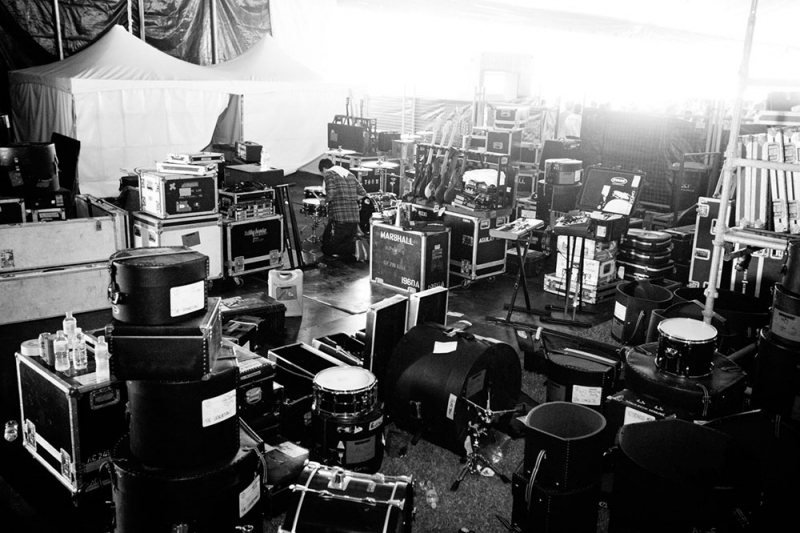
"Always SO. MUCH. GEAR. How it doesn’t get lost is a mystery. PS It does get lost."
Photo by Kane Hibberd - Book: Kanye Lens Vs Soundwave Volume 1 -
Letlive<br />Soundwave 2012, Adelaide

"This is LetLive in Adelaide, the stage was running really late and the band were about to get their 30 min setup cut really short, so they just never stopped playing. They turned the lights off. They kept playing. They cut the power. They kept playing. They were literally going to be dragged off so they started helping clear the stage."
Photo by Kane Hibberd - Book: Kanye Lens Vs Soundwave Volume 1 -
Less Than Jake Soundwave 2011
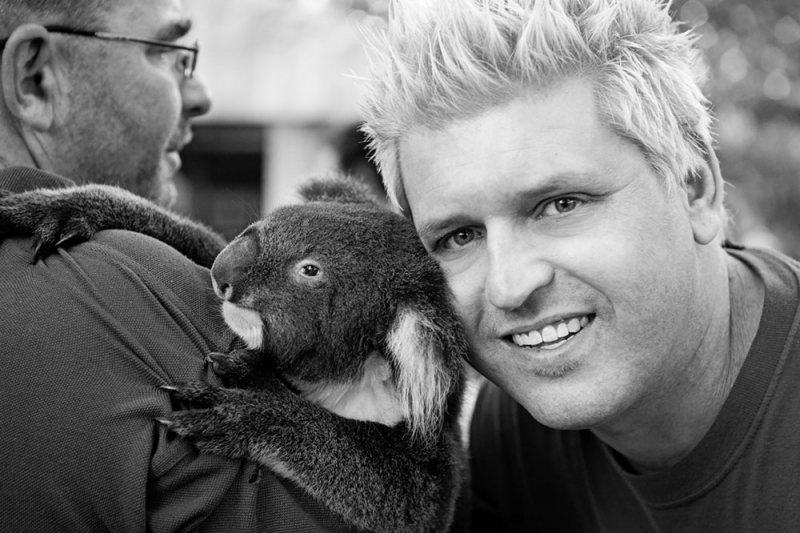
"At some of the shows, Soundwave would organise people with native animals to come backstage to show the artists. This is Chris DeMakes of Less Than Jake in Adelaide. I live in Australia and have never been that close to a koala."
Photo by Kane Hibberd - Book: Kanye Lens Vs Soundwave Volume 1 -
You Me At Six<br />Soundwave 2012, Perth

Photo by Kane Hibberd - Book: Kanye Lens Vs Soundwave Volume 1 -
Testament<br />Soundwave 2014, Melbourne

"Free Tattoos? Yes please. The folks at Eurkea Rebellion Trading tattooing Chuck Billy from Testament in Melbourne."
Photo by Kane Hibberd - Book: Kanye Lens Vs Soundwave Volume 1 -
Thursday<br />Soundwave 2012, Perth

"Thursday played their last ever show at Soundwave Festival Perth. This is Anthony Green from Circa Survive giving a hug to Thursday singer, Geoff Rickly. It was a pretty emotional show."
Photo by Kane Hibberd - Book: Kanye Lens Vs Soundwave Volume 1 -
Bert (The Used) & Jenna (Tonight Alive) Soundwave 2015

"Bert McCracken from the Used came out and did some guest vocals with Tonight Alive this year in Sydney with Jenna McDougall. Nice time."
Photo by Kane Hibberd - Book: Kanye Lens Vs Soundwave Volume 1 -
Alexisonfire<br />Soundwave 2010, Sydney

Photo by Kane Hibberd - Book: Kanye Lens Vs Soundwave Volume 1 -
Down<br />Soundwave 2014, Melbourne

"I did a shoot with Down during the week off, between Sydney and Melbourne Soundwaves. When I was shooting Melbourne side of stage, Phil recognised me, dragged me on stage, and I took this photo. I was actually shitting my pants, not knowing what was happening. I thought originally I might have done something to piss him off. What a legend."
Photo by Kane Hibberd - Book: Kanye Lens Vs Soundwave Volume 1 -
View From Above Soundwave 2013, Perth

Photo by Kane Hibberd - Book: Kanye Lens Vs Soundwave Volume 1 -
Soundwave 2009, Perth

Photo by Kane Hibberd - Book: Kanye Lens Vs Soundwave Volume 1 -
(Hayley Williams) Paramore & Davey Havok (AFI) Soundwave 2010, Perth

Photo by Kane Hibberd - Book: Kanye Lens Vs Soundwave Volume 1 -
Real Friends<br />Soundwave 2014, Brisbane

Photo by Kane Hibberd - Book: Kanye Lens Vs Soundwave Volume 1 -
Bullet For My Valentine<br />Soundwave 2011, Sydney

Photo by Kane Hibberd - Book: Kanye Lens Vs Soundwave Volume 1 -
The Living End<br />Soundwave 2014, Melbourne

Photo by Kane Hibberd - Book: Kanye Lens Vs Soundwave Volume 1 -
Pennywise<br />Soundwave 2014, Adelaide
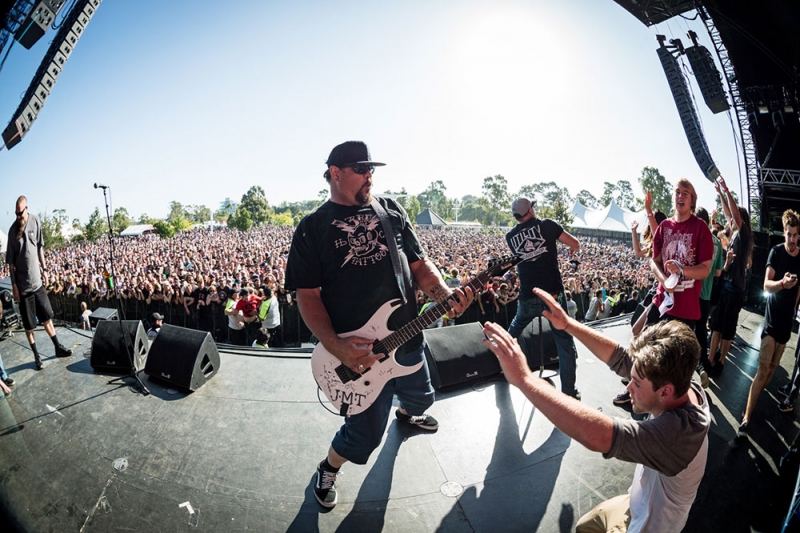
"Onstage with Pennywise during Bro Hymn. Oooooooh oooh oooh oooooooohhhh. That’s my bad, bro hymn."
Photo by Kane Hibberd - Book: Kanye Lens Vs Soundwave Volume 1 -
AFI<br />Soundwave 2010, Melbourne

Photo by Kane Hibberd - Book: Kanye Lens Vs Soundwave Volume 1 -
Limp Bizkit<br />Soundwave 2012, Melbourne

Photo by Kane Hibberd - Book: Kanye Lens Vs Soundwave Volume 1 -
ADTR Crowd Surf Soundwave 2012, Brisbane

"This is that thing that A Day To Remember get everyone to do, but I can’t remember what they call it. It’s essentially crowd surfing, on a crowd surfer."
Photo by Kane Hibberd - Book: Kanye Lens Vs Soundwave Volume 1 -
All Time Low Soundwave 2015, Sydney

"Sydney this year during All Time Low. A massive storm came over and they eventually had to stop for 20 minutes as it was an absolute downpour."
Photo by Kane Hibberd - Book: Kanye Lens Vs Soundwave Volume 1 -
Soundwave 2014, Adelaide

Photo by Kane Hibberd - Book: Kanye Lens Vs Soundwave Volume 1 -
Anti-flag<br />Soundwave 2010, Sydney

Photo by Kane Hibberd - Book: Kanye Lens Vs Soundwave Volume 1 -
Guitar Tech<br />Soundwave 2013, Brisbane
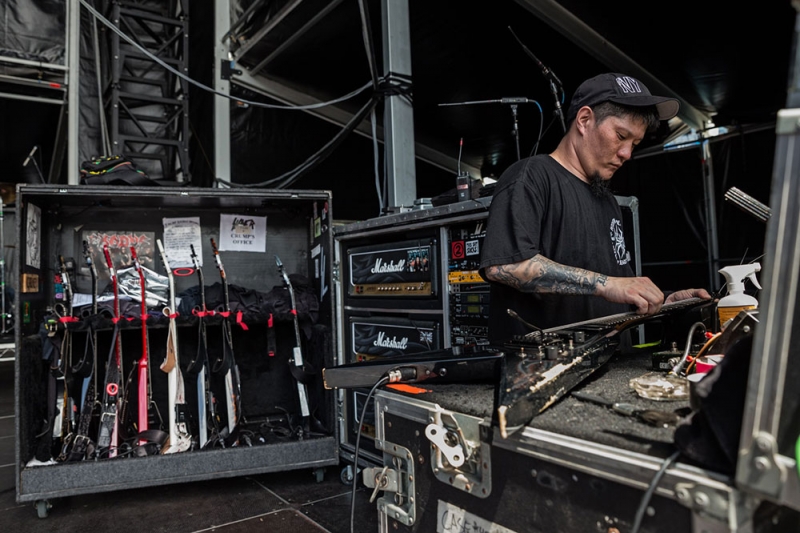
Photo by Kane Hibberd - Book: Kanye Lens Vs Soundwave Volume 1 -
Slayer<br />Soundwave 2011, Perth

Photo by Kane Hibberd - Book: Kanye Lens Vs Soundwave Volume 1 -
30 Seconds To Mars Soundwave 2011, Melbourne

"Whether you like 30 Seconds To Mars or not, they put on one hell of a performance. This was during a song where they invite the audience onstage. Gets pretty darn hectic."
Photo by Kane Hibberd - Book: Kanye Lens Vs Soundwave Volume 1 -
The Bronx<br />Soundwave 2011, Brisbane

"This is the Centerfold!"
Photo by Kane Hibberd - Book: Kanye Lens Vs Soundwave Volume 1 -
Fucked Up<br />Soundwave 2015, Sydney

Photo by Kane Hibberd - Book: Kanye Lens Vs Soundwave Volume 1 -
The Subways Soundwave 2009, Sydney

"As I was walking past the stage, I heard a voice onstage say, if you don’t start moving, I’m getting in there with you. I quickly ran to the pit and basically got my camera to my eye as he was in mid flight. Yes, he did make it, but even he said he had his doubts mid jump, ha."
Photo by Kane Hibberd - Book: Kanye Lens Vs Soundwave Volume 1 -
Backtage<br />Soundwave 2013, Perth

"The crew having a bit of fun with some black tie dinner service for the stage managers on the main stage at Soundwave 2013 in Perth."
Photo by Kane Hibberd - Book: Kanye Lens Vs Soundwave Volume 1 -
Helicopter Flight Soundwave 2011, Adelaide

"Slayer has a mate who owns a helicopter so they came to the festival in it, (as you do), and he was generous enough to give me a flight to take some photos. It was the first time I had been in a helicopter, loved it!"
Photo by Kane Hibberd - Book: Kanye Lens Vs Soundwave Volume 1 -
A Day To Remember Soundwave 2014, Adelaide

Photo by Kane Hibberd - Book: Kanye Lens Vs Soundwave Volume 1 -
The Dillinger Escape Plan Soundwave 2014, Adelaide
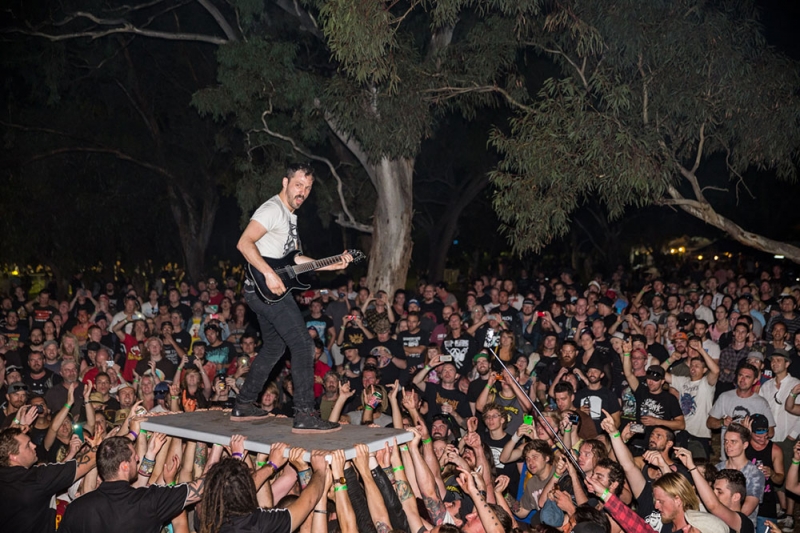
Photo by Kane Hibberd - Book: Kanye Lens Vs Soundwave Volume 1 -
The Amity Affliction Soundwave 2013, Melbourne

"I think this guy crowd surfed to the front in his wheel chair and Joel got him on stage. What a legend!"
Photo by Kane Hibberd - Book: Kanye Lens Vs Soundwave Volume 1 -
Nine Inch Nails Soundwave 2009, Brisbane

Photo by Kane Hibberd - Book: Kanye Lens Vs Soundwave Volume 1 -
Janes Addiction Soundwave 2010, Brisbane

Photo by Kane Hibberd - Book: Kanye Lens Vs Soundwave Volume 1 -
System Of A Down Soundwave 2012, Melbourne

Photo by Kane Hibberd - Book: Kanye Lens Vs Soundwave Volume 1 -
Motionless In White Soundwave 2014, Melbourne

Photo by Kane Hibberd - Book: Kanye Lens Vs Soundwave Volume 1 -
Metallica<br />Soundwave 2013, Perth

Photo by Kane Hibberd - Book: Kanye Lens Vs Soundwave Volume 1 -
Mastodon<br />Soundwave 2014

Photo by Kane Hibberd - Book: Kanye Lens Vs Soundwave Volume 1 -
Metallica<br />Soundwave 2013, Perth

Photo by Kane Hibberd - Book: Kanye Lens Vs Soundwave Volume 1 -
Brisbane Airport Soundwave 2009

"Baggage coming into Brisbane as everyone starts to arrive."
Photo by Kane Hibberd - Book: Kanye Lens Vs Soundwave Volume 1 -
Soundwave Festival: Memorable Moments #57

"This is Alexander Hagman from Raised Fist after running around on stage for an hour. I asked if I could take a quick snap and this is what I got. Amazing."
Photo by Kane Hibberd - Book: Kanye Lens Vs Soundwave Volume 1 -
Soundwave 2010, Adelaide

Photo by Kane Hibberd - Book: Kanye Lens Vs Soundwave Volume 1 -
Of Mice & Men Soundwave 2015, Melbourne

Photo by Kane Hibberd - Book: Kanye Lens Vs Soundwave Volume 1 -
Max Cavalera Soundwave 2015, Melbourne

"Max Cavalera after playing his first show with Killer Be Killed. Another fucking hot Soundwave day."
Photo by Kane Hibberd - Book: Kanye Lens Vs Soundwave Volume 1 -
Soundwave 2009, Melbourne
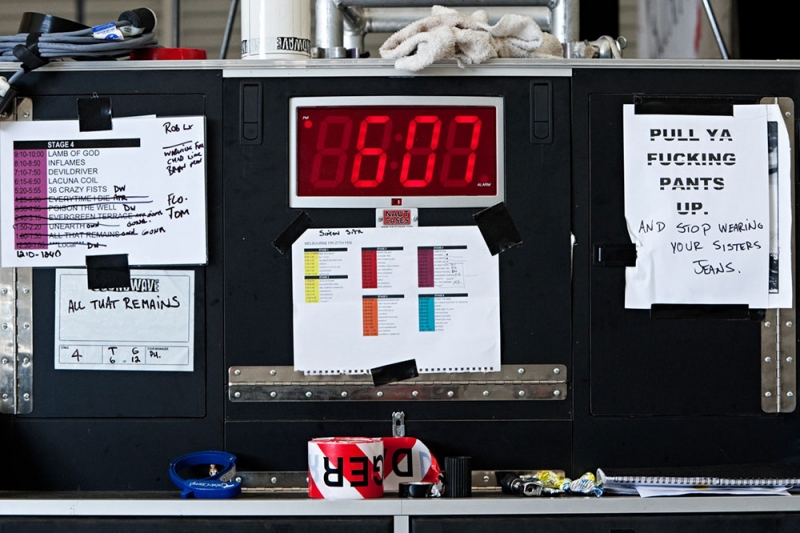
Photo by Kane Hibberd - Book: Kanye Lens Vs Soundwave Volume 1 -
Soundwave 2014, Perth
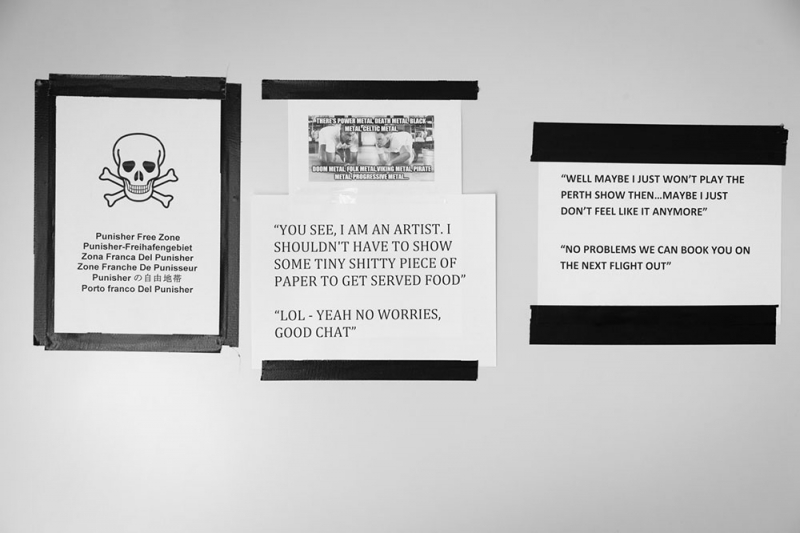
"Soundwave has a great sense of humour. Yes these are actual quotes from artists."
Photo by Kane Hibberd - Book: Kanye Lens Vs Soundwave Volume 1 -
LetLive<br />Soundwave 2014, Melbourne

Photo by Kane Hibberd - Book: Kanye Lens Vs Soundwave Volume 1 -
Foxy Shazam Soundwave 2011, Perth

Photo by Kane Hibberd - Book: Kanye Lens Vs Soundwave Volume 1 -
Down Signing Soundwave 2014, Adelaide

"Soundwave had meet and greets during the festival where all the money was donated to Camp Quality. This is Phil Anselmo, from Down. Everyone gets a little emotional sometimes, but the bands always met every last person."
Photo by Kane Hibberd - Book: Kanye Lens Vs Soundwave Volume 1 -
Panic At The Disco Backstage Soundwave 2014, Melbourne

Photo by Kane Hibberd - Book: Kanye Lens Vs Soundwave Volume 1 -
Dudesons Soundwave 2008, Adelaide

"This is some fans hanging over the fence backstage getting some autographs. I thought it was hilarious when I rounded a fence and saw exactly what you are looking at."
Photo by Kane Hibberd - Book: Kanye Lens Vs Soundwave Volume 1 -
Slash & Alterbridge Backstage Soundwave 2012, Sydney
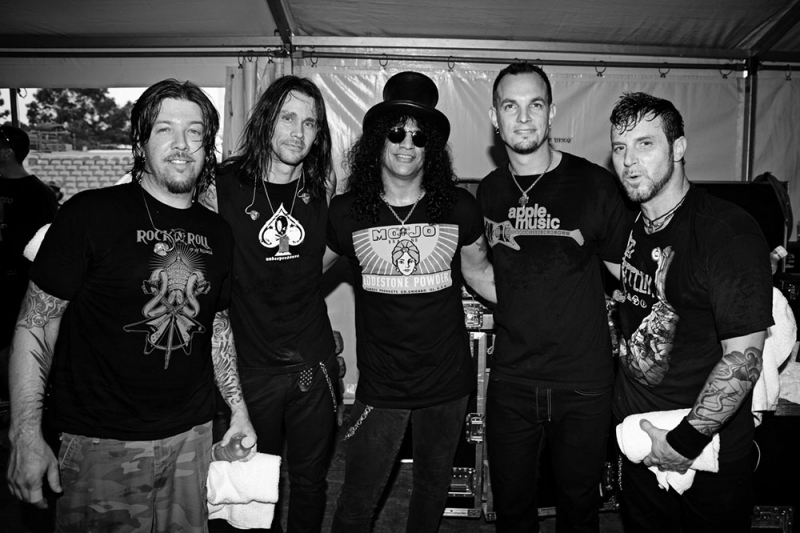
Photo by Kane Hibberd - Book: Kanye Lens Vs Soundwave Volume 1 -
Eagles Of Death Metal & Jimmy Eat World Backstage Soundwave 2010, Melbourne
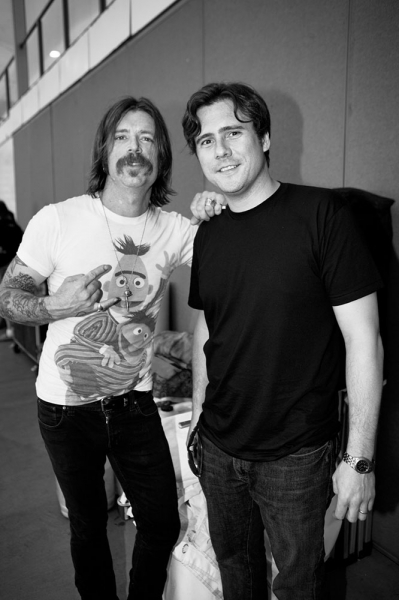
Photo by Kane Hibberd - Book: Kanye Lens Vs Soundwave Volume 1 -
Soundwave 2015, Sydney

Photo by Kane Hibberd - Book: Kanye Lens Vs Soundwave Volume 1 -
Slipknot<br />Soundwave 2012, Perth

Photo by Kane Hibberd - Book: Kanye Lens Vs Soundwave Volume 1 -
Marilyn Manson Soundwave 2012, Melbourne

Photo by Kane Hibberd - Book: Kanye Lens Vs Soundwave Volume 1 -
Greenday Soundwave 2014, Perth

Photo by Kane Hibberd - Book: Kanye Lens Vs Soundwave Volume 1 -
The BossHoss Soundwave 2014, Perth

"One of the best bands you probably never saw at Soundwave 2014, The BossHoss."
Photo by Kane Hibberd - Book: Kanye Lens Vs Soundwave Volume 1 -
Unearth Soundwave 2012, Melbourne

Photo by Kane Hibberd - Book: Kanye Lens Vs Soundwave Volume 1 -
Killswitch Engage Soundwave 2008, Perth

Photo by Kane Hibberd - Book: Kanye Lens Vs Soundwave Volume 1 -
Alice In Chains Soundwave 2009, Perth

Photo by Kane Hibberd - Book: Kanye Lens Vs Soundwave Volume 1 -
The Bennies<br />Soundwave 2015, Sydney

Photo by Kane Hibberd - Book: Kanye Lens Vs Soundwave Volume 1 -
Fletcher (Pennywise) Onstage With The Bronx Soundwave 2011, Perth

"In 2011, Fletcher from Pennywise got annihilated and decided it would be a good idea to get onstage with the Bronx and cut himself to freak a few people out. I think he nailed it."
Photo by Kane Hibberd - Book: Kanye Lens Vs Soundwave Volume 1 -
Meshuggah Soundwave 2010, Melbourne

Photo by Kane Hibberd - Book: Kanye Lens Vs Soundwave Volume 1 -
Enter Shikari Soundwave 2010, Brisbane

"Enter Shikari singer, Roughton Reynolds, cops a bass to the head in Brisbane."
Photo by Kane Hibberd - Book: Kanye Lens Vs Soundwave Volume 1 -
5 finger Death Punch Backstage Soundwave 2014, Perth

Photo by Kane Hibberd - Book: Kanye Lens Vs Soundwave Volume 1 -
The End Of Tony Abbott (Gwar) Soundwave 2014, Sydney

Photo by Kane Hibberd - Book: Kanye Lens Vs Soundwave Volume 1 -
Black Veil Brides Soundwave 2014, Adelaide

Photo by Kane Hibberd - Book: Kanye Lens Vs Soundwave Volume 1 -
Bring Me The Horizon Backstage Soundwave 2011, Brisbane

Photo by Kane Hibberd - Book: Kanye Lens Vs Soundwave Volume 1 -
Dashboard Confessional Backstage Soundwave 2012, Adelaide

Photo by Kane Hibberd - Book: Kanye Lens Vs Soundwave Volume 1 -
While She Sleeps Soundwave 2013, Perth

Photo by Kane Hibberd - Book: Kanye Lens Vs Soundwave Volume 1 -
Crossfaith<br />Soundwave 2013, Brisbane

Photo by Kane Hibberd - Book: Kanye Lens Vs Soundwave Volume 1 -
Ok Rock Backstage Soundwave 2015, Melbourne
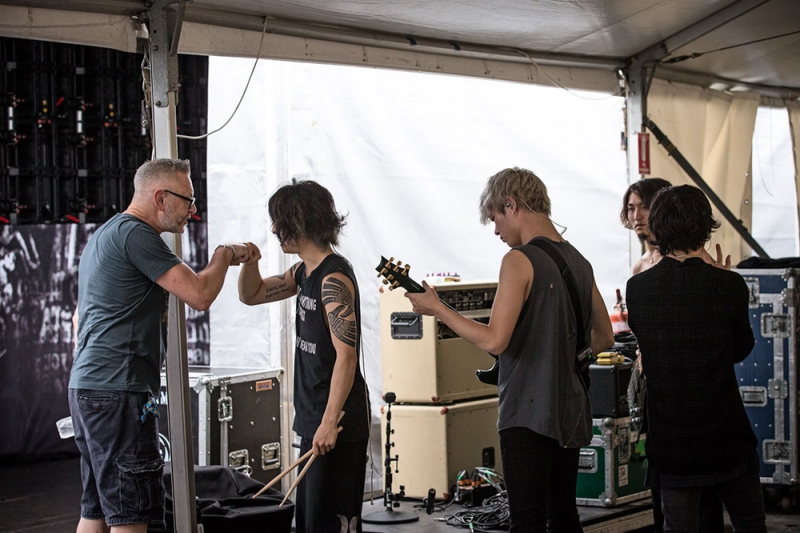
Photo by Kane Hibberd - Book: Kanye Lens Vs Soundwave Volume 1 -
Steel Panther & Gerard Way Backstage Soundwave 2015

"Just before Steel Panther went on, Gerard Way who had just finished on the adjacent stage, popped over to tell Michael Starr that he was a fan. Someone got stoked!"
Photo by Kane Hibberd - Book: Kanye Lens Vs Soundwave Volume 1 -
Fletcher (Pennywise) & Trash Talk Backstage

Photo by Kane Hibberd - Book: Kanye Lens Vs Soundwave Volume 1 -
Atleast He's Honest<br />Soundwave 2013, Perth

Photo by Kane Hibberd - Book: Kanye Lens Vs Soundwave Volume 1 -
The Vandals Backstage Soundwave 2013, Adelaide

"In between the artist backstage and the festival there was a little park and during one of my commutes I ran into Dave Quackenbush from The Vandals killing some time."
Photo by Kane Hibberd - Book: Kanye Lens Vs Soundwave Volume 1 -
The Bloodhound Gang Backstage Soundwave 2009, Perth

"This is Jimmy Pop after their Perth show. Again it was fucking hot. About 10 seconds after I took this photo two of his band mates walked up and pissed in it."
Photo by Kane Hibberd - Book: Kanye Lens Vs Soundwave Volume 1 -
The Chariot <br />Soundwave 2013, Melbourne

"This is Stephen Harrison finding yet new ways to destroy his guitars. That is a fucking long way up. Cray cray."
Photo by Kane Hibberd - Book: Kanye Lens Vs Soundwave Volume 1 -
Strung Out Marriage Soundwave 2012, Perth

"In Perth Jake Kiley from Strung Out got married on Stage by Greg Hetson (Bad Religion) and Bert McCracken was the maid of honour, with Brooks Wackerman being the best man." Photo by Kane Hibberd - Book: Kanye Lens Vs Soundwave Volume 1 -
Northlane<br />Soundwave 2013, Sydney

Photo by Kane Hibberd - Book: Kanye Lens Vs Soundwave Volume 1 -
Bring Me The Horizon Soundwave 2013, Melbourne

Photo by Kane Hibberd - Book: Kanye Lens Vs Soundwave Volume 1 -
Faith No More Soundwave 2010, Perth

Photo by Kane Hibberd - Book: Kanye Lens Vs Soundwave Volume 1 -
Crossfaith<br />Soundwave 2013, Sydnety

Photo by Kane Hibberd - Book: Kanye Lens Vs Soundwave Volume 1 -
Duff McKagan Soundwave 2014, Adelaide

Photo by Kane Hibberd - Book: Kanye Lens Vs Soundwave Volume 1 -
Iron Maiden Soundwave 2011, Melbourne

Photo by Kane Hibberd - Book: Kanye Lens Vs Soundwave Volume 1 -
Bring Me The Horizon Soundwave 2013, Melbourne

"This was in Melbourne during Bring Me The Horizon’s set. They had just released Sempiternal and it was so packed in that tent, everyone was going nuts. There were bodies on top of bodies."
Photo by Kane Hibberd - Book: Kanye Lens Vs Soundwave Volume 1 -
Sleeping With Sirens Soundwave 2013, Melbourne

Photo by Kane Hibberd - Book: Kanye Lens Vs Soundwave Volume 1 -
Mindless Self Indulgence Soundwave 2013, Adelaide

Photo by Kane Hibberd - Book: Kanye Lens Vs Soundwave Volume 1 -
Stonesour Backstage Soundwave 2013, Sydney
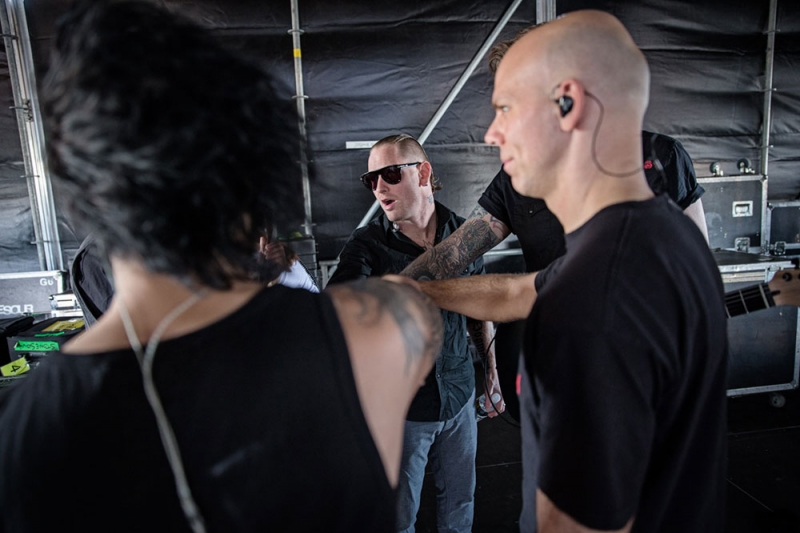
Photo by Kane Hibberd - Book: Kanye Lens Vs Soundwave Volume 1 -
Soundwave 2011, Sydney

Photo by Kane Hibberd - Book: Kanye Lens Vs Soundwave Volume 1 -
Trash Talk Soundwave 2011, Perth

Photo by Kane Hibberd - Book: Kanye Lens Vs Soundwave Volume 1 -
Soundwave 2011, Brisbane

Photo by Kane Hibberd - Book: Kanye Lens Vs Soundwave Volume 1 -
Jedi Soundwave 2008, Perth

Photo by Kane Hibberd - Book: Kanye Lens Vs Soundwave Volume 1 -
Gallows<br />Soundwave 2013, Adelaide

Photo by Kane Hibberd - Book: Kanye Lens Vs Soundwave Volume 1 -
The Blackout<br />Soundwave 2013, Adelaide

"This is the singer of the Blackout, Sean Smith in the crowd, standing in his own circle pit. Great dude! I loved that band."
Photo by Kane Hibberd - Book: Kanye Lens Vs Soundwave Volume 1 -
Soundwave 2013, Adelaide

Photo by Kane Hibberd - Book: Kanye Lens Vs Soundwave Volume 1 -
Backstage<br />Soundwave 2013, Perth

Photo by Kane Hibberd - Book: Kanye Lens Vs Soundwave Volume 1 -
Sum 41<br />Soundwave 2013, Perth

Photo by Kane Hibberd - Book: Kanye Lens Vs Soundwave Volume 1 -
All Time Low Soundwave 2013, Perth

Photo by Kane Hibberd - Book: Kanye Lens Vs Soundwave Volume 1 -
Antemasque Soundwave 2015, Melbourne

Photo by Kane Hibberd - Book: Kanye Lens Vs Soundwave Volume 1 -
Korn<br />Soundwave 2014, Perth

Photo by Kane Hibberd - Book: Kanye Lens Vs Soundwave Volume 1 -
Paramore Soundwave 2014, Perth

Photo by Kane Hibberd - Book: Kanye Lens Vs Soundwave Volume 1 -
Greenday Soundwave 2014, Melbourne

"Each night Greenday would bring up a fan to help sing a song. This girl was such a mega fan."
Photo by Kane Hibberd - Book: Kanye Lens Vs Soundwave Volume 1 -
Rob Zombie Soundwave 2014, Perth

Photo by Kane Hibberd - Book: Kanye Lens Vs Soundwave Volume 1 -
Gwar<br />Soundwave 2014, Perth

Photo by Kane Hibberd - Book: Kanye Lens Vs Soundwave Volume 1 -
Metallica<br />Soundwave 2013, Sydney

"This was during Metallica in Sydney. Stupid idea to light a flare in the crowd, when they can put your face up on the bring screen."
Photo by Kane Hibberd - Book: Kanye Lens Vs Soundwave Volume 1 -
Cerebral Ballzy Soundwave 2014, Perth

Photo by Kane Hibberd - Book: Kanye Lens Vs Soundwave Volume 1 -
A Day To Remember, Korn, The Story So Far Soundwave 2014, Brisbane

"I was taking a quick snap of A Day To Remember and the next thing you know, members of Korn and The Story So Far have jumped in. That’s why I loved Soundwave."
Photo by Kane Hibberd - Book: Kanye Lens Vs Soundwave Volume 1 -
King Parrot Soundwave 2015, Melbourne

Photo by Kane Hibberd - Book: Kanye Lens Vs Soundwave Volume 1 -
Steel Panther Soundwave 2015, Melbourne

Photo by Kane Hibberd - Book: Kanye Lens Vs Soundwave Volume 1 -
Avenged Sevenfold Soundwave 2014, Brisbane

Photo by Kane Hibberd - Book: Kanye Lens Vs Soundwave Volume 1 -
The Chariot Soundwave 2013, Perth

Photo by Kane Hibberd - Book: Kanye Lens Vs Soundwave Volume 1
